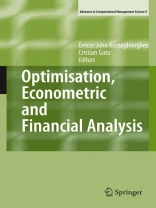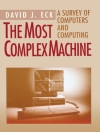Advanced computational methods are often employed for the solution of modelling and decision-making problems. This book addresses issues associated with the interface of computing, optimisation, econometrics and financial modelling. Emphasis is given to computational optimisation methods and techniques. The first part of the book addresses optimisation problems and decision modelling, with special attention to applications of supply chain and worst-case modelling as well as advances in the methodological aspects of optimisation techniques. The second part of the book is devoted to optimisation heuristics, filtering, signal extraction and various time series models. The chapters in this part cover the application of threshold accepting in econometrics, the structure of threshold autoregressive moving average models, wavelet analysis and signal extraction techniques in time series. The third and final part of the book is about the use of optimisation in portfolio selection and real option modelling.
Jadual kandungan
Optimisation Models and Methods.- A Supply Chain Network Perspective for Electric Power Generation, Supply, Transmission, and Consumption.- Worst-Case Modelling for Management Decisions under Incomplete Information, with Application to Electricity Spot Markets.- An Approximate Winner Determination Algorithm for Hybrid Procurement Mechanisms Logistics.- Proximal-ACCPM: A Versatile Oracle Based Optimisation Method.- A Survey of Different Integer Programming Formulations of the Travelling Salesman Problem.- Econometric Modelling and Prediction.- The Threshold Accepting Optimisation Algorithm in Economics and Statistics.- The Autocorrelation Functions in SETARMA Models.- Trend Estimation and De-Trending.- Non-Dyadic Wavelet Analysis.- Measuring Core Inflation by Multivariate Structural Time Series Models.- Financial Modelling.- Random Portfolios for Performance Measurement.- Real Options with Random Controls, Rare Events, and Risk-to-Ruin.












